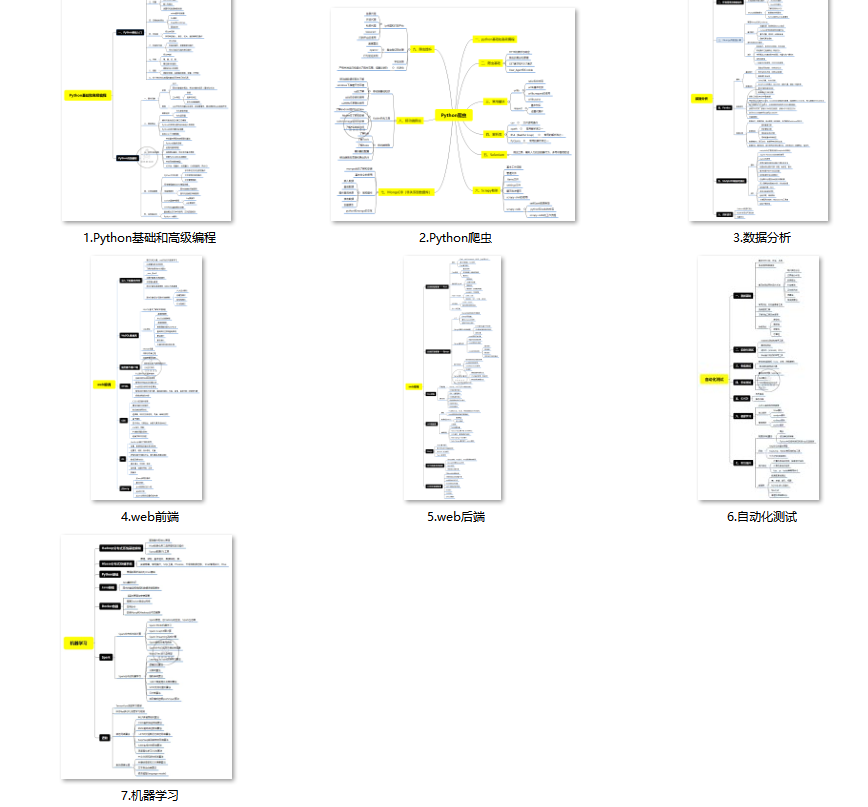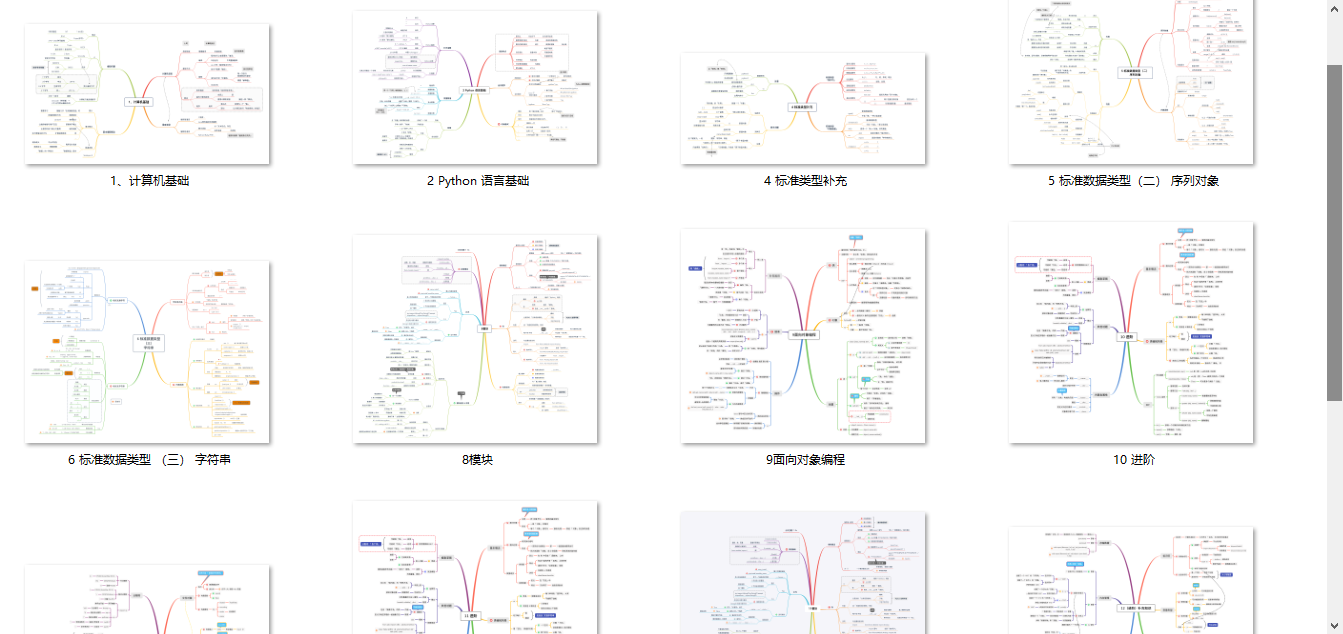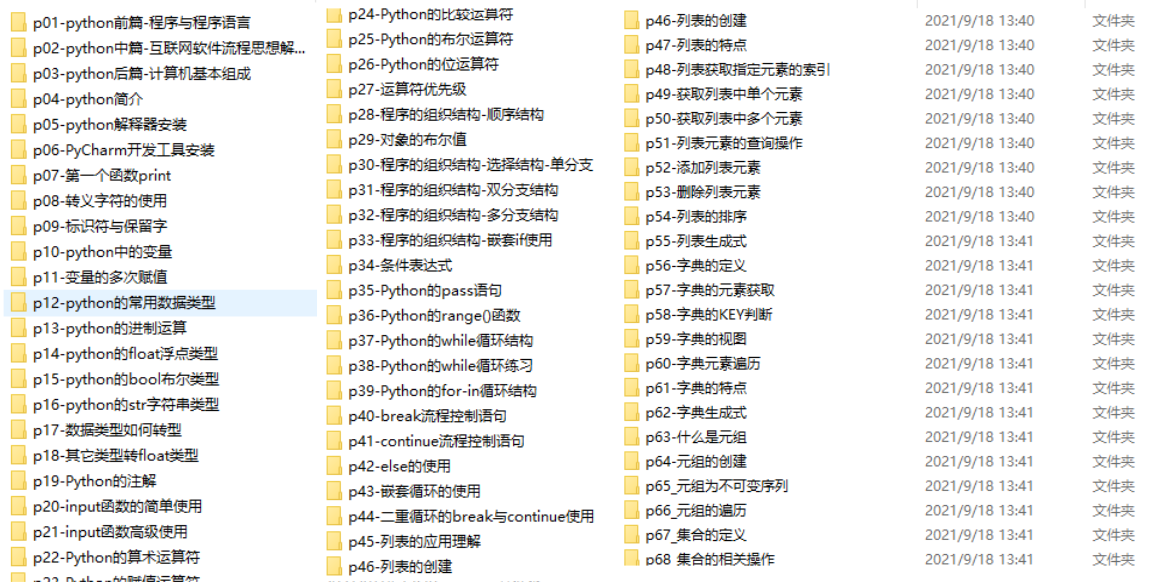做了那么多年开发,自学了很多门编程语言,我很明白学习资源对于学一门新语言的重要性,这些年也收藏了不少的Python干货,对我来说这些东西确实已经用不到了,但对于准备自学Python的人来说,或许它就是一个宝藏,可以给你省去很多的时间和精力。
别在网上瞎学了,我最近也做了一些资源的更新,只要你是我的粉丝,这期福利你都可拿走。
我先来介绍一下这些东西怎么用,文末抱走。
(1)Python所有方向的学习路线(新版)
这是我花了几天的时间去把Python所有方向的技术点做的整理,形成各个领域的知识点汇总,它的用处就在于,你可以按照上面的知识点去找对应的学习资源,保证自己学得较为全面。
最近我才对这些路线做了一下新的更新,知识体系更全面了。

(2)Python学习视频
包含了Python入门、爬虫、数据分析和web开发的学习视频,总共100多个,虽然没有那么全面,但是对于入门来说是没问题的,学完这些之后,你可以按照我上面的学习路线去网上找其他的知识资源进行进阶。

(3)100多个练手项目
我们在看视频学习的时候,不能光动眼动脑不动手,比较科学的学习方法是在理解之后运用它们,这时候练手项目就很适合了,只是里面的项目比较多,水平也是参差不齐,大家可以挑自己能做的项目去练练。

(4)200多本电子书
这些年我也收藏了很多电子书,大概200多本,有时候带实体书不方便的话,我就会去打开电子书看看,书籍可不一定比视频教程差,尤其是权威的技术书籍。
基本上主流的和经典的都有,这里我就不放图了,版权问题,个人看看是没有问题的。
(5)Python知识点汇总
知识点汇总有点像学习路线,但与学习路线不同的点就在于,知识点汇总更为细致,里面包含了对具体知识点的简单说明,而我们的学习路线则更为抽象和简单,只是为了方便大家只是某个领域你应该学习哪些技术栈。

(6)其他资料
还有其他的一些东西,比如说我自己出的Python入门图文类教程,没有电脑的时候用手机也可以学习知识,学会了理论之后再去敲代码实践验证,还有Python中文版的库资料、MySQL和HTML标签大全等等,这些都是可以送给粉丝们的东西。

这些都不是什么非常值钱的东西,但对于没有资源或者资源不是很好的学习者来说确实很不错,你要是用得到的话都可以直接抱走,关注过我的人都知道,这些都是可以拿到的。
网上学习资料一大堆,但如果学到的知识不成体系,遇到问题时只是浅尝辄止,不再深入研究,那么很难做到真正的技术提升。
一个人可以走的很快,但一群人才能走的更远!不论你是正从事IT行业的老鸟或是对IT行业感兴趣的新人,都欢迎加入我们的的圈子(技术交流、学习资源、职场吐槽、大厂内推、面试辅导),让我们一起学习成长!
>>> import format
>>> dir(format)
['FormatParagraph', 'FormatRegion', 'Indents', 'Rstrip', '__builtins__', '__cached__',
'__doc__', '__file__', '__loader__', '__name__', '__package__', '__spec__',
'_line_indent_re', 'askinteger', 'askyesno', 'find_paragraph', 'get_comment_header',
'get_indent', 'get_line_indent', 'idleConf', 'is_all_white', 're', 'reformat_comment',
'reformat_paragraph']
35. help()
Help on module help:
NAME
help
MODULE REFERENCE
https://docs.python.org/3.11/library/help.html
The following documentation is automatically generated from the Python
source files. It may be incomplete, incorrect or include features that
are considered implementation detail and may vary between Python
implementations. When in doubt, consult the module reference at the
location listed above.
DESCRIPTION
help.py: Implement the Idle help menu.
Contents are subject to revision at any time, without notice.
Help => About IDLE: display About Idle dialog
<to be moved here from help_about.py>
Help => IDLE Help: Display help.html with proper formatting.
Doc/library/idle.rst (Sphinx)=> Doc/build/html/library/idle.html
(help.copy_strip)=> Lib/idlelib/help.html
HelpParser - Parse help.html and render to tk Text.
HelpText - Display formatted help.html.
HelpFrame - Contain text, scrollbar, and table-of-contents.
(This will be needed for display in a future tabbed window.)
HelpWindow - Display HelpFrame in a standalone window.
copy_strip - Copy idle.html to help.html, rstripping each line.
show_idlehelp - Create HelpWindow. Called in EditorWindow.help_dialog.
CLASSES
html.parser.HTMLParser(_markupbase.ParserBase)
HelpParser
tkinter.Text(tkinter.Widget, tkinter.XView, tkinter.YView)
HelpText
tkinter.Toplevel(tkinter.BaseWidget, tkinter.Wm)
HelpWindow
tkinter.ttk.Frame(tkinter.ttk.Widget)
HelpFrame
FILE
d:\program files\python\lib\idlelib\help.py
>>> import help
>>> dir(help)
['Frame', 'HTMLParser', 'HelpFrame', 'HelpParser', 'HelpText', 'HelpWindow', 'Menu',
'Menubutton', 'Scrollbar', 'Text', 'Toplevel', '__builtins__', '__cached__', '__doc__',
'__file__', '__loader__', '__name__', '__package__', '__spec__', 'abspath', 'copy_strip',
'dirname', 'idleConf', 'isfile', 'join', 'python_version', 'show_idlehelp', 'tkfont']
对象 object
5个来自_sitebuiltins模块中的对象:
17. copyright()
Help on _Printer in module _sitebuiltins object:
copyright = class _Printer(builtins.object)
| copyright(name, data, files=(), dirs=())
|
| interactive prompt objects for printing the license text, a list of
| contributors and the copyright notice.
>>> copyright()
Copyright (c) 2001-2022 Python Software Foundation.
All Rights Reserved.
Copyright (c) 2000 BeOpen.com.
All Rights Reserved.
Copyright (c) 1995-2001 Corporation for National Research Initiatives.
All Rights Reserved.
Copyright (c) 1991-1995 Stichting Mathematisch Centrum, Amsterdam.
All Rights Reserved.
18. credits()
Help on _Printer in module _sitebuiltins object:
credits = class _Printer(builtins.object)
| credits(name, data, files=(), dirs=())
|
| interactive prompt objects for printing the license text, a list of
| contributors and the copyright notice.
>>> credits()
Thanks to CWI, CNRI, BeOpen.com, Zope Corporation and a cast of thousands
for supporting Python development. See www.python.org for more information.
44. license()
Help on _Printer in module _sitebuiltins object:
license = class _Printer(builtins.object)
| license(name, data, files=(), dirs=())
|
| interactive prompt objects for printing the license text, a list of
| contributors and the copyright notice.
>>> license()
A. HISTORY OF THE SOFTWARE
==========================
Python was created in the early 1990s by Guido van Rossum at Stichting
Mathematisch Centrum (CWI, see http://www.cwi.nl) in the Netherlands
as a successor of a language called ABC. Guido remains Python's
principal author, although it includes many contributions from others.
In 1995, Guido continued his work on Python at the Corporation for
National Research Initiatives (CNRI, see http://www.cnri.reston.va.us)
in Reston, Virginia where he released several versions of the
software.
In May 2000, Guido and the Python core development team moved to
BeOpen.com to form the BeOpen PythonLabs team. In October of the same
year, the PythonLabs team moved to Digital Creations, which became
Zope Corporation. In 2001, the Python Software Foundation (PSF, see
https://www.python.org/psf/) was formed, a non-profit organization
created specifically to own Python-related Intellectual Property.
Zope Corporation was a sponsoring member of the PSF.
All Python releases are Open Source (see http://www.opensource.org for
the Open Source Definition). Historically, most, but not all, Python
Hit Return for more, or q (and Return) to quit:
Hit Return for more, or q (and Return) to quit:
releases have also been GPL-compatible; the table below summarizes
the various releases.
Release Derived Year Owner GPL-
from compatible? (1)
0.9.0 thru 1.2 1991-1995 CWI yes
1.3 thru 1.5.2 1.2 1995-1999 CNRI yes
1.6 1.5.2 2000 CNRI no
2.0 1.6 2000 BeOpen.com no
1.6.1 1.6 2001 CNRI yes (2)
2.1 2.0+1.6.1 2001 PSF no
2.0.1 2.0+1.6.1 2001 PSF yes
2.1.1 2.1+2.0.1 2001 PSF yes
2.1.2 2.1.1 2002 PSF yes
2.1.3 2.1.2 2002 PSF yes
2.2 and above 2.1.1 2001-now PSF yes
Hit Return for more, or q (and Return) to quit:
。。。略。。。
26. exit()
Help on Quitter in module _sitebuiltins object:
exit = class Quitter(builtins.object)
| exit(name, eof)
59. quit()
Help on Quitter in module _sitebuiltins object:
quit = class Quitter(builtins.object)
| quit(name, eof)
类 class
26个builtins模块的内建类,主要是各种数据类型,如整型、浮点型、复数型、字符串、枚举、切片、元组、列表、字典、集合、映射、字节数组、反向迭代器、筛选器、装饰器、range、zip、frozenset 等等。
08. bool()
Help on class bool in module builtins:
class bool(int)
| bool(x) -> bool
|
| Returns True when the argument x is true, False otherwise.
| The builtins True and False are the only two instances of the class bool.
| The class bool is a subclass of the class int, and cannot be subclassed.
10. bytearray()
Help on class bytearray in module builtins:
class bytearray(object)
| bytearray(iterable_of_ints) -> bytearray
| bytearray(string, encoding[, errors]) -> bytearray
| bytearray(bytes_or_buffer) -> mutable copy of bytes_or_buffer
| bytearray(int) -> bytes array of size given by the parameter initialized with null bytes
| bytearray() -> empty bytes array
|
| Construct a mutable bytearray object from:
| - an iterable yielding integers in range(256)
| - a text string encoded using the specified encoding
| - a bytes or a buffer object
| - any object implementing the buffer API.
| - an integer
11. bytes()
Help on class bytes in module builtins:
class bytes(object)
| bytes(iterable_of_ints) -> bytes
| bytes(string, encoding[, errors]) -> bytes
| bytes(bytes_or_buffer) -> immutable copy of bytes_or_buffer
| bytes(int) -> bytes object of size given by the parameter initialized with null bytes
| bytes() -> empty bytes object
|
| Construct an immutable array of bytes from:
| - an iterable yielding integers in range(256)
| - a text string encoded using the specified encoding
| - any object implementing the buffer API.
| - an integer
14. classmethod()
Help on class classmethod in module builtins:
class classmethod(object)
| classmethod(function) -> method
|
| Convert a function to be a class method.
|
| A class method receives the class as implicit first argument,
| just like an instance method receives the instance.
| To declare a class method, use this idiom:
|
| class C:
| @classmethod
| def f(cls, arg1, arg2, …):
| …
|
| It can be called either on the class (e.g. C.f()) or on an instance
| (e.g. C().f()). The instance is ignored except for its class.
| If a class method is called for a derived class, the derived class
| object is passed as the implied first argument.
|
| Class methods are different than C++ or Java static methods.
| If you want those, see the staticmethod builtin.
16. complex()
Help on class complex in module builtins:
class complex(object)
| complex(real=0, imag=0)
|
| Create a complex number from a real part and an optional imaginary part.
|
| This is equivalent to (real + imag*1j) where imag defaults to 0.
20. dict()
Help on class dict in module builtins:
class dict(object)
| dict() -> new empty dictionary
| dict(mapping) -> new dictionary initialized from a mapping object’s
| (key, value) pairs
| dict(iterable) -> new dictionary initialized as if via:
| d = {}
| for k, v in iterable:
| d[k] = v
| dict(**kwargs) -> new dictionary initialized with the name=value pairs
| in the keyword argument list. For example: dict(one=1, two=2)
23. enumerate()
Help on class enumerate in module builtins:
class enumerate(object)
| enumerate(iterable, start=0)
|
| Return an enumerate object.
|
| iterable
| an object supporting iteration
|
| The enumerate object yields pairs containing a count (from start, which
| defaults to zero) and a value yielded by the iterable argument.
|
| enumerate is useful for obtaining an indexed list:
| (0, seq[0]), (1, seq[1]), (2, seq[2]), …
27. filter()
Help on class filter in module builtins:
class filter(object)
| filter(function or None, iterable) --> filter object
|
| Return an iterator yielding those items of iterable for which function(item)
| is true. If function is None, return the items that are true.
28. float()
Help on class float in module builtins:
class float(object)
| float(x=0, /)
|
| Convert a string or number to a floating point number, if possible.
30. frozenset()
Help on class frozenset in module builtins:
class frozenset(object)
| frozenset() -> empty frozenset object
| frozenset(iterable) -> frozenset object
|
| Build an immutable unordered collection of unique elements.
39. int()
Help on class int in module builtins:
class int(object)
| int([x]) -> integer
| int(x, base=10) -> integer
|
| Convert a number or string to an integer, or return 0 if no arguments
| are given. If x is a number, return x.__int__(). For floating point
| numbers, this truncates towards zero.
|
| If x is not a number or if base is given, then x must be a string,
| bytes, or bytearray instance representing an integer literal in the
| given base. The literal can be preceded by ‘+’ or ‘-’ and be surrounded
| by whitespace. The base defaults to 10. Valid bases are 0 and 2-36.
| Base 0 means to interpret the base from the string as an integer literal.
| >>> int(‘0b100’, base=0)
| 4
|
| Built-in subclasses:
| bool
45. list()
Help on class list in module builtins:
class list(object)
| list(iterable=(), /)
|
| Built-in mutable sequence.
|
| If no argument is given, the constructor creates a new empty list.
| The argument must be an iterable if specified.
47. map()
Help on class map in module builtins:
class map(object)
| map(func, *iterables) --> map object
|
| Make an iterator that computes the function using arguments from
| each of the iterables. Stops when the shortest iterable is exhausted.
49. memoryview()
Help on class memoryview in module builtins:
class memoryview(object)
| memoryview(object)
|
| Create a new memoryview object which references the given object.
52. object()
Help on class object in module builtins:
class object
| The base class of the class hierarchy.
|
| When called, it accepts no arguments and returns a new featureless
| instance that has no instance attributes and cannot be given any.
|
| Built-in subclasses:
| anext_awaitable
| async_generator
| async_generator_asend
| async_generator_athrow
| … and 89 other subclasses
58. property()
Help on class property in module builtins:
class property(object)
| property(fget=None, fset=None, fdel=None, doc=None)
|
| Property attribute.
|
| fget
| function to be used for getting an attribute value
| fset
| function to be used for setting an attribute value
| fdel
| function to be used for del’ing an attribute
| doc
| docstring
|
| Typical use is to define a managed attribute x:
|
| class C(object):
| def getx(self): return self._x
| def setx(self, value): self._x = value
| def delx(self): del self._x
| x = property(getx, setx, delx, “I’m the ‘x’ property.”)
|
| Decorators make defining new properties or modifying existing ones easy:
|
| class C(object):
| @property
| def x(self):
| “I am the ‘x’ property.”
| return self._x
| @x.setter
| def x(self, value):
| self._x = value
| @x.deleter
| def x(self):
| del self._x
60. range()
Help on class range in module builtins:
class range(object)
| range(stop) -> range object
| range(start, stop[, step]) -> range object
|
| Return an object that produces a sequence of integers from start (inclusive)
| to stop (exclusive) by step. range(i, j) produces i, i+1, i+2, …, j-1.
| start defaults to 0, and stop is omitted! range(4) produces 0, 1, 2, 3.
| These are exactly the valid indices for a list of 4 elements.
| When step is given, it specifies the increment (or decrement).
62. reversed()
Help on class reversed in module builtins:
class reversed(object)
| reversed(sequence, /)
|
| Return a reverse iterator over the values of the given sequence.
64. set()
Help on class set in module builtins:
class set(object)
| set() -> new empty set object
| set(iterable) -> new set object
|
| Build an unordered collection of unique elements.
66. slice()
Help on class slice in module builtins:
class slice(object)
| slice(stop)
| slice(start, stop[, step])
|
| Create a slice object. This is used for extended slicing (e.g. a[0:10:2]).
68. staticmethod()
Help on class staticmethod in module builtins:
class staticmethod(object)
| staticmethod(function) -> method
|
| Convert a function to be a static method.
|
| A static method does not receive an implicit first argument.
| To declare a static method, use this idiom:
|
| class C:
| @staticmethod
| def f(arg1, arg2, …):
| …
|
| It can be called either on the class (e.g. C.f()) or on an instance
| (e.g. C().f()). Both the class and the instance are ignored, and
| neither is passed implicitly as the first argument to the method.
|
| Static methods in Python are similar to those found in Java or C++.
| For a more advanced concept, see the classmethod builtin.
69. str()
Help on class str in module builtins:
class str(object)
| str(object=‘’) -> str
| str(bytes_or_buffer[, encoding[, errors]]) -> str
|
| Create a new string object from the given object. If encoding or
| errors is specified, then the object must expose a data buffer
| that will be decoded using the given encoding and error handler.
| Otherwise, returns the result of object.__str__() (if defined)
| or repr(object).
| encoding defaults to sys.getdefaultencoding().
| errors defaults to ‘strict’.
71. super()
Help on class super in module builtins:
class super(object)
| super() -> same as super(__class__, )
| super(type) -> unbound super object
| super(type, obj) -> bound super object; requires isinstance(obj, type)
| super(type, type2) -> bound super object; requires issubclass(type2, type)
| Typical use to call a cooperative superclass method:
| class C(B):
| def meth(self, arg):
| super().meth(arg)
| This works for class methods too:
| class C(B):
| @classmethod
| def cmeth(cls, arg):
| super().cmeth(arg)
72. tuple()
Help on class tuple in module builtins:
class tuple(object)
| tuple(iterable=(), /)
|
| Built-in immutable sequence.
|
| If no argument is given, the constructor returns an empty tuple.
| If iterable is specified the tuple is initialized from iterable’s items.
|
| If the argument is a tuple, the return value is the same object.
73. type()
Help on class type in module builtins:
class type(object)
| type(object) -> the object’s type
| type(name, bases, dict, **kwds) -> a new type
75. zip()
Help on class zip in module builtins:
class zip(object)
| zip(*iterables, strict=False) --> Yield tuples until an input is exhausted.
|
| >>> list(zip(‘abcdefg’, range(3), range(4)))
| [(‘a’, 0, 0), (‘b’, 1, 1), (‘c’, 2, 2)]
|
| The zip object yields n-length tuples, where n is the number of iterables
| passed as positional arguments to zip(). The i-th element in every tuple
| comes from the i-th iterable argument to zip(). This continues until the
| shortest argument is exhausted.
|
| If strict is true and one of the arguments is exhausted before the others,
| raise a ValueError.
内置函数 built-in function
真正的的内置函数有42个,除了open()来自io模块,其它都是builtins模块中的函数。
01. abs()
Help on built-in function abs in module builtins:
abs(x, /)
Return the absolute value of the argument.
02. aiter()
Help on built-in function aiter in module builtins:
aiter(async_iterable, /)
Return an AsyncIterator for an AsyncIterable object.
03. all()
Help on built-in function all in module builtins:
all(iterable, /)
Return True if bool(x) is True for all values x in the iterable.
If the iterable is empty, return True.
04. anext()
Help on built-in function anext in module builtins:
anext(…)
async anext(aiterator[, default])
Return the next item from the async iterator. If default is given and the async
iterator is exhausted, it is returned instead of raising StopAsyncIteration.
05. any()
Help on built-in function any in module builtins:
any(iterable, /)
Return True if bool(x) is True for any x in the iterable.
If the iterable is empty, return False.
06. ascii()
Help on built-in function ascii in module builtins:
ascii(obj, /)
Return an ASCII-only representation of an object.
As repr(), return a string containing a printable representation of an
object, but escape the non-ASCII characters in the string returned by
repr() using \\\\x, \\\\u or \\\\U escapes. This generates a string similar
to that returned by repr() in Python 2.
07. bin()
Help on built-in function bin in module builtins:
bin(number, /)
Return the binary representation of an integer.
>>> bin(2796202)
'0b1010101010101010101010'
09. breakpoint()
Help on built-in function breakpoint in module builtins:
breakpoint(…)
breakpoint(*args, **kws)
Call sys.breakpointhook(\*args, \*\*kws). sys.breakpointhook() must accept
whatever arguments are passed.
By default, this drops you into the pdb debugger.
12. callable()
Help on built-in function callable in module builtins:
callable(obj, /)
Return whether the object is callable (i.e., some kind of function).
Note that classes are callable, as are instances of classes with a
\_\_call\_\_() method.
13. chr()
Help on built-in function chr in module builtins:
chr(i, /)
Return a Unicode string of one character with ordinal i; 0 <= i <= 0x10ffff.
15. compile()
Help on built-in function compile in module builtins:
compile(source, filename, mode, flags=0, dont_inherit=False, optimize=-1, *, _feature_version=-1)
Compile source into a code object that can be executed by exec() or eval().
The source code may represent a Python module, statement or expression.
The filename will be used for run-time error messages.
The mode must be 'exec' to compile a module, 'single' to compile a
single (interactive) statement, or 'eval' to compile an expression.
The flags argument, if present, controls which future statements influence
the compilation of the code.
The dont\_inherit argument, if true, stops the compilation inheriting
the effects of any future statements in effect in the code calling
compile; if absent or false these statements do influence the compilation,
in addition to any features explicitly specified.
19. delattr()
Help on built-in function delattr in module builtins:
delattr(obj, name, /)
Deletes the named attribute from the given object.
delattr(x, 'y') is equivalent to \`\`del x.y''
21. dir()
Help on built-in function dir in module builtins:
dir(…)
dir([object]) -> list of strings
If called without an argument, return the names in the current scope.
Else, return an alphabetized list of names comprising (some of) the attributes
of the given object, and of attributes reachable from it.
If the object supplies a method named \_\_dir\_\_, it will be used; otherwise
the default dir() logic is used and returns:
for a module object: the module's attributes.
for a class object: its attributes, and recursively the attributes
of its bases.
for any other object: its attributes, its class's attributes, and
recursively the attributes of its class's base classes.
22. divmod()
Help on built-in function divmod in module builtins:
divmod(x, y, /)
Return the tuple (x//y, x%y). Invariant: div*y + mod == x.
24. eval()
Help on built-in function eval in module builtins:
eval(source, globals=None, locals=None, /)
Evaluate the given source in the context of globals and locals.
The source may be a string representing a Python expression
or a code object as returned by compile().
The globals must be a dictionary and locals can be any mapping,
defaulting to the current globals and locals.
If only globals is given, locals defaults to it.
25. exec()
Help on built-in function exec in module builtins:
exec(source, globals=None, locals=None, /, *, closure=None)
Execute the given source in the context of globals and locals.
The source may be a string representing one or more Python statements
or a code object as returned by compile().
The globals must be a dictionary and locals can be any mapping,
defaulting to the current globals and locals.
If only globals is given, locals defaults to it.
The closure must be a tuple of cellvars, and can only be used
when source is a code object requiring exactly that many cellvars.
31. getattr()
Help on built-in function getattr in module builtins:
getattr(…)
getattr(object, name[, default]) -> value
Get a named attribute from an object; getattr(x, 'y') is equivalent to x.y.
When a default argument is given, it is returned when the attribute doesn't
exist; without it, an exception is raised in that case.
32. globals()
Help on built-in function globals in module builtins:
globals()
Return the dictionary containing the current scope’s global variables.
NOTE: Updates to this dictionary \*will\* affect name lookups in the current
global scope and vice-versa.
33. hasattr()
Help on built-in function hasattr in module builtins:
hasattr(obj, name, /)
Return whether the object has an attribute with the given name.
This is done by calling getattr(obj, name) and catching AttributeError.
34. hash()
Help on built-in function hash in module builtins:
hash(obj, /)
Return the hash value for the given object.
Two objects that compare equal must also have the same hash value, but the
reverse is not necessarily true.
36. hex()
Help on built-in function hex in module builtins:
hex(number, /)
Return the hexadecimal representation of an integer.
>>> hex(12648430)
'0xc0ffee'
37. id()
Help on built-in function id in module builtins:
id(obj, /)
Return the identity of an object.
This is guaranteed to be unique among simultaneously existing objects.
(CPython uses the object's memory address.)
38. input()
Help on built-in function input in module builtins:
input(prompt=None, /)
Read a string from standard input. The trailing newline is stripped.
The prompt string, if given, is printed to standard output without a
trailing newline before reading input.
If the user hits EOF (\*nix: Ctrl-D, Windows: Ctrl-Z+Return), raise EOFError.
On \*nix systems, readline is used if available.
40. isinstance()
Help on built-in function isinstance in module builtins:
isinstance(obj, class_or_tuple, /)
Return whether an object is an instance of a class or of a subclass thereof.
A tuple, as in \`\`isinstance(x, (A, B, ...))\`\`, may be given as the target to
check against. This is equivalent to \`\`isinstance(x, A) or isinstance(x, B)
or ...\`\` etc.
41. issubclass()
Help on built-in function issubclass in module builtins:
issubclass(cls, class_or_tuple, /)
Return whether ‘cls’ is derived from another class or is the same class.
A tuple, as in \`\`issubclass(x, (A, B, ...))\`\`, may be given as the target to
check against. This is equivalent to \`\`issubclass(x, A) or issubclass(x, B)
or ...\`\`.
42. iter()
Help on built-in function iter in module builtins:
iter(…)
iter(iterable) -> iterator
iter(callable, sentinel) -> iterator
Get an iterator from an object. In the first form, the argument must
supply its own iterator, or be a sequence.
In the second form, the callable is called until it returns the sentinel.
43. len()
Help on built-in function len in module builtins:
len(obj, /)
Return the number of items in a container.
46. locals()
Help on built-in function locals in module builtins:
locals()
Return a dictionary containing the current scope’s local variables.
NOTE: Whether or not updates to this dictionary will affect name lookups in
the local scope and vice-versa is \*implementation dependent\* and not
covered by any backwards compatibility guarantees.
48. max()
Help on built-in function max in module builtins:
max(…)
max(iterable, *[, default=obj, key=func]) -> value
max(arg1, arg2, *args, *[, key=func]) -> value
With a single iterable argument, return its biggest item. The
default keyword-only argument specifies an object to return if
the provided iterable is empty.
With two or more arguments, return the largest argument.
50. min()
Help on built-in function min in module builtins:
min(…)
min(iterable, *[, default=obj, key=func]) -> value
min(arg1, arg2, *args, *[, key=func]) -> value
With a single iterable argument, return its smallest item. The
default keyword-only argument specifies an object to return if
the provided iterable is empty.
With two or more arguments, return the smallest argument.
51. next()
Help on built-in function next in module builtins:
next(…)
next(iterator[, default])
Return the next item from the iterator. If default is given and the iterator
is exhausted, it is returned instead of raising StopIteration.
53. oct()
Help on built-in function oct in module builtins:
oct(number, /)
Return the octal representation of an integer.
>>> oct(342391)
'0o1234567'
54. open()
Help on built-in function open in module io:
open(file, mode=‘r’, buffering=-1, encoding=None, errors=None, newline=None, closefd=True, opener=None)
Open file and return a stream. Raise OSError upon failure.
Character Meaning
--------- ---------------------------------------------------------------
'r' open for reading (default)
'w' open for writing, truncating the file first
'x' create a new file and open it for writing
'a' open for writing, appending to the end of the file if it exists
'b' binary mode
't' text mode (default)
'+' open a disk file for updating (reading and writing)
55. ord()
Help on built-in function ord in module builtins:
ord(c, /)
Return the Unicode code point for a one-character string.
56. pow()
Help on built-in function pow in module builtins:
pow(base, exp, mod=None)
Equivalent to base**exp with 2 arguments or base**exp % mod with 3 arguments
Some types, such as ints, are able to use a more efficient algorithm when
invoked using the three argument form.
57. print()
Help on built-in function print in module builtins:
print(*args, sep=’ ‘, end=’\n’, file=None, flush=False)
Prints the values to a stream, or to sys.stdout by default.
sep
string inserted between values, default a space.
end
string appended after the last value, default a newline.
file
a file-like object (stream); defaults to the current sys.stdout.
flush
whether to forcibly flush the stream.
61. repr()
现在能在网上找到很多很多的学习资源,有免费的也有收费的,当我拿到1套比较全的学习资源之前,我并没着急去看第1节,我而是去审视这套资源是否值得学习,有时候也会去问一些学长的意见,如果可以之后,我会对这套学习资源做1个学习计划,我的学习计划主要包括规划图和学习进度表。
分享给大家这份我薅到的免费视频资料,质量还不错,大家可以跟着学习

网上学习资料一大堆,但如果学到的知识不成体系,遇到问题时只是浅尝辄止,不再深入研究,那么很难做到真正的技术提升。
一个人可以走的很快,但一群人才能走的更远!不论你是正从事IT行业的老鸟或是对IT行业感兴趣的新人,都欢迎加入我们的的圈子(技术交流、学习资源、职场吐槽、大厂内推、面试辅导),让我们一起学习成长!






















 8万+
8万+











 被折叠的 条评论
为什么被折叠?
被折叠的 条评论
为什么被折叠?








